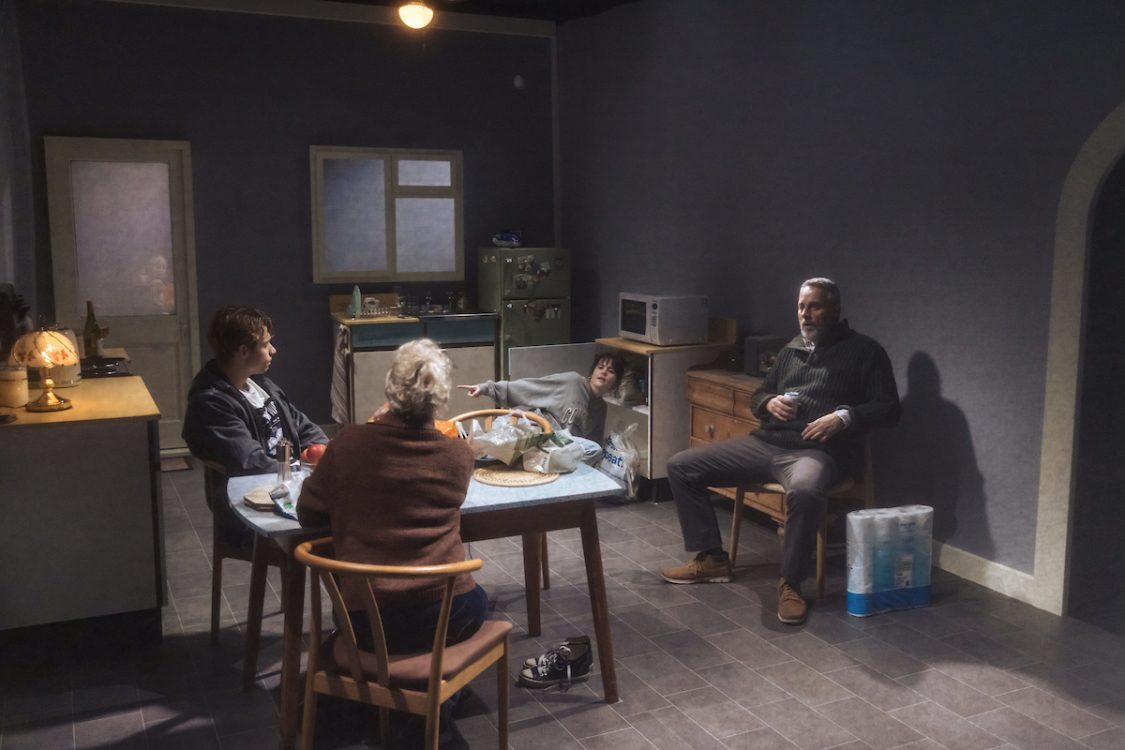With a nod to the ‘kitchen-sink dramas’ of the 1960s, Here is set in a dreary kitchen somewhere in the West Midlands, a setting for family arguments and grudges of its four members. We encounter the likeable Matt, a drifter back from his wanderings on a visit to his alcoholic aunt Monica, her long-suffering boyfriend and daughter. His intention is to record the ghosts of the house where his grandparents lived. Coming from the Midlands, I totally understood the conversations of this family life. The cultural references are right on message – this is a life of crisps and chicken Kiev and Carnation milk with tinned peaches.
Matt is welcomed by the family and he also offers them a new perspective, yet the house is haunted by previous relationships and irreparable harms. All the family have problems: Monica hates her job and thinks she’s past her sell-by date. Her explosive passion is frightening, though not to her husband and daughter who have seen it all before. Jeff, the gentle husband has a gambling problem. Monica’s daughter Jess feels she fails at everything, her lesbian relationship falling apart, ‘I feel like I’m edges. Like, I can feel my whole outline but there’s nothing else, nothing in the middle.’ In between and around their arguments, Matt records the sounds of the house when no-one is speaking, and plays them back again and again in attempts to hear the murmur of the past. He says, ‘There’s something about this house, something here. Something in the walls. Its bones. Like DNA.’ He is looking for something, but I never really found out what that was.
Sam Baker-Jones in his professional stage debut excels as the friendly, talkative, youthful slacker Matt. He leads the show. Lucy Benjamin gives it her all as the argumentative Monica just holding it together. Hannah Millard, as Jess, pulls off a seemingly indifferent daughter who really just wants her mother to open up. Mark Frost plays vulnerable so well, we all feel sorry for him.
In a challenging piece of set design, the play is performed behind white sheets of gauze on all three sides facing the audience making up the walls of the house. The gauze symbolises the divisions both between people, and between the present and the past, a barrier through which things can be seen but never fully realised. It is an understandable conceit, but it became irritating and no replacement for the use of dialogue to convey the same message. It simply makes the experience of watching seem ‘foggy’.
Here, by first-timer Clive Judd, is the winner of the Papatango New Writing Prize. It recalls family dramas like those of Eugene O’Neill and Chekhov where characters talk over each other and run on their own tracks. They are all too familiar with the same patterns of speech and the same obsessions, half-remembered family stories about inconsequential encounters with a fish or a shop assistant. This family lives a life of hidden things – the mobile phone in the freezer, the alcohol in a tea towel under the sink behind the Jif. The dialogue is spot on for the Midlands, though the accents of a couple of the actors slipped.
We understand Jeff’s relationship with sound, but what is it about the water – drinking water (‘Great water, this’) and insisting on both a bath and a shower? The symbols seem insufficiently digested, perhaps to foreshadow secrets which are never properly resolved. Is Matt looking for his mother or has he really spoken to her recently? Who is Jess’s father? What are the ‘dark rooms, strangers, shadows’ of Monica’s life?
The questions arise but the play does not contain the resolutions, nor does the central metaphor, of the listening house which remembers all, point towards a solution.

